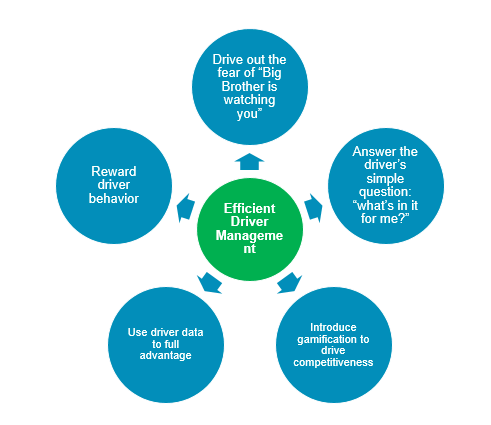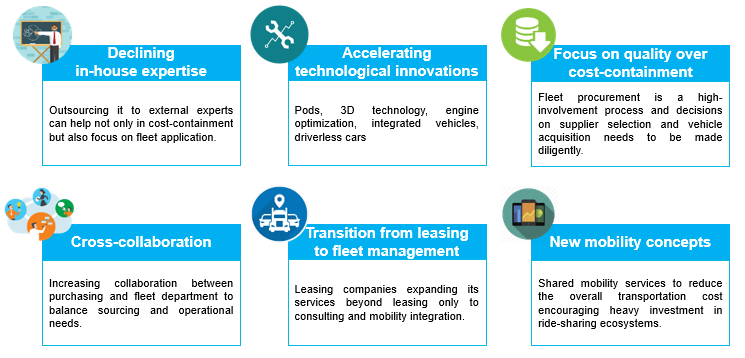Key takeaways
- Technological Advancements: Adoption of current and emerging technologies is driving growth and efficiency in the European fleet management market.
- Procurement Complexity: Effective fleet procurement involves managing costs, navigating manufacturers’ price rises, and selecting reliable suppliers and potential suppliers.
- EV Integration: Integrating EV fleets offers long-term savings and environmental benefits, but requires strategic planning and investment.
- Operational Efficiency: Utilizing fleet management software and conducting thorough market research are essential for optimizing fleet operations and maintaining value for money.
The fleet management market in Europe has been exhibiting promising growth over the past couple of years. Modern vehicles are getting more fuel-efficient, environmental friendly, and having an extended vehicle life, which, in turn, is reducing the Total Cost of Ownership (TCO). This is subsequently contributing towards the growth of the fleet management market in Europe. The growth prospects for the fleet management market in Europe looks positive with the rising number of commercial vehicles.
Landscape of the European Fleet Management Market
Fleet procurement can be a complicated and time-consuming affair since a fleet decision-maker has to deal with dynamic market-wide variables such as country-wise regulations, fuel prices, manufacturers’ price rises, maintenance labor rates, and other service-related costs. The impact of the decision usually is not instantaneous; it can be felt years after the decision has been made since it’s a massive investment with many complex components. One of the primary concerns in fleet procurement is the cost of money. Understanding the cost of funding is crucial as it influences the overall budget and financial planning. Additionally, manufacturers’ price rises can significantly impact the initial purchase price of vehicles, making it essential to consider both current technology and emerging technology when making procurement decisions.
In the procurement process, selecting the right supplier is vital. Building a strong fleet/supplier relationship can help in negotiating better terms and ensuring timely deliveries. It is also important to evaluate the supplier’s suppliers to ensure a reliable supply chain. Regular contract revision is necessary to adapt to changing conditions and maintain value for money. As the trend towards sustainability grows, integrating an EV fleet into the procurement strategy can offer long-term savings and environmental benefits. However, transitioning to an EV fleet requires careful planning and investment in emerging technology.
For public sector fleets, the procurement process may involve additional layers of compliance and regulatory considerations. Conducting thorough market research and seeking customer references can aid in identifying the most reliable and cost-effective potential suppliers. Implementing fleet management software is essential for modern fleet operations. It helps in tracking vehicles, optimizing routes, scheduling maintenance, and ensuring overall efficiency. Evaluating fleet management software as part of the procurement strategy ensures that the technology aligns with the organization’s needs. Ultimately, a successful fleet procurement strategy involves a comprehensive analysis of all these factors to achieve value for money and support the organization’s operational goals.
Big organizations often involve their finance department along with procurement and compliance department to take the final decision. It is advisable to include all affected stakeholder during the fleet procurement process as a best practice to avoid discrepancies.
European Fleet Industry Progressing Their Procurement Practices
The fleet industry in Europe is attempting to remain efficient by revisiting their current procurement practices and giving up on traditional measures to adopt industry best practices. Advancement of technology is easing the pressure on the fleet industry by enhancing the car performance in terms of powertrain, fuel-economy, engine optimizations, safety features, and smartphone integration. Also, lowered insurance costs, maintenance and fuel costs, tax rates, and time efficiency factors are driving down the TCO of a vehicle.
Here’s a look at how the fleet industry is improving their procurement practices:
Trends in Europe Fleet Management Market
Shifting Focus Towards Mobility Management
Europe fleet management management market, in particular, accounts for the highest car-sharing service per capita with a customer base of over 2 million. The car sharing practice would hurt new-car purchases but would significantly reduce the TCO as several fixed costs such as maintenance, repair, depreciation, and insurance are shared.
Stakeholders in the fleet procurement are also exploring blending connectivity options to bring about efficiency. Apart from extending the services provided by the leasing companies, they are exploring ways of delivering added value through data management and predictive flexibility. Customers are offered a wide variety of mobility solutions with the advent of multimodal transport solutions, vehicle analytics, and car-sharing. This, in turn, pushes the car manufacturers to accommodate their business activities to provide a one-stop solution to customers. Car manufacturers are reliant on autonomous and electric vehicles to enhance features, increase driver safety, and bring down the overall running costs. Fleet managers are thus compelled to look for innovative options to not only save on procurement costs but also enhance the value to their organization.
How can Driverless Cars Shape the Fleet Management Industry?
Driverless cars have brought about a paradigm shift in the fleet management industry. Intensive machine learning and automation have transformed the driverless car technology to such an extent that such vehicles can operate itself better than a human. Automotive players along with technology giants are investing huge sums in this technology to roll out more autonomous cars in the European roads.
This breakthrough technology will affect a fleet manager’s decision-making process. Here’s how:
Telematics to Enhance Fleet Performance
Telematics takes the efficiency of fleet management to the next level by carrying out an analysis of driver data and suggesting measures to improve the effectiveness. The goal of telematics is of efficient driver management by means of collecting driver data to provide timely feedback to assist drivers on safer driver behavior. Also, driver incentives are associated with key metrics to ensure optimal driver behavior. The incentive calculations are done using sophisticated analytics – taking into account parameters such as mileage, fuel usage, idle time, and driver behavior, which rewards them using points-based systems. The real-time data gathered from a telematics system can provide constant updates to reduce delays and handle traffic more efficiently.

To know more about fleet management market in Europe:
Conclusion
The fleet management market in Europe is experiencing promising growth due to advancements in current technology and the adoption of emerging technology. As fleet decision-makers navigate the complexities of the procurement process, they must consider manufacturers’ price rises, the cost of funding, and the selection of reliable suppliers and potential suppliers. Building strong fleet/supplier relationships and regularly conducting contract revision are crucial for maintaining value for money. The integration of an EV fleet can offer long-term savings and environmental benefits, but it requires strategic investment and careful planning. For public sector fleets, the procurement process involves additional layers of compliance, necessitating thorough market research and the evaluation of customer references. Fleet management software plays a vital role in modern fleet operations by optimizing routes, scheduling maintenance, and improving overall efficiency. Evaluating suppliers, including the supplier’s suppliers and their premises, ensures a reliable supply chain. Ultimately, the successful implementation of a comprehensive fleet procurement strategy will enhance operational efficiency, reduce the Total Cost of Ownership (TCO), and support the organization’s strategic goals.






